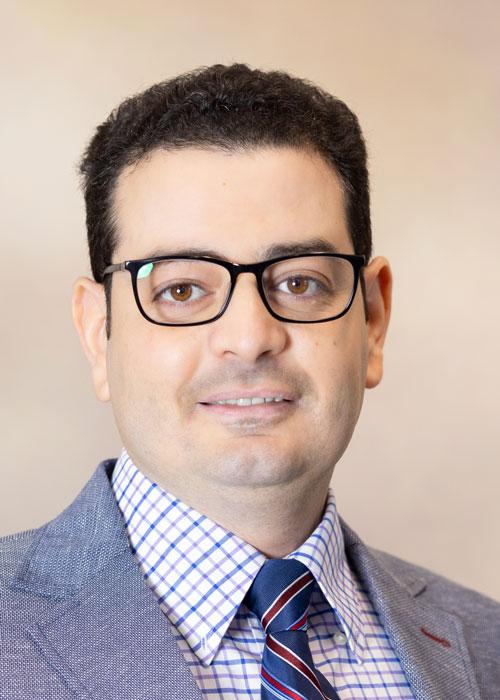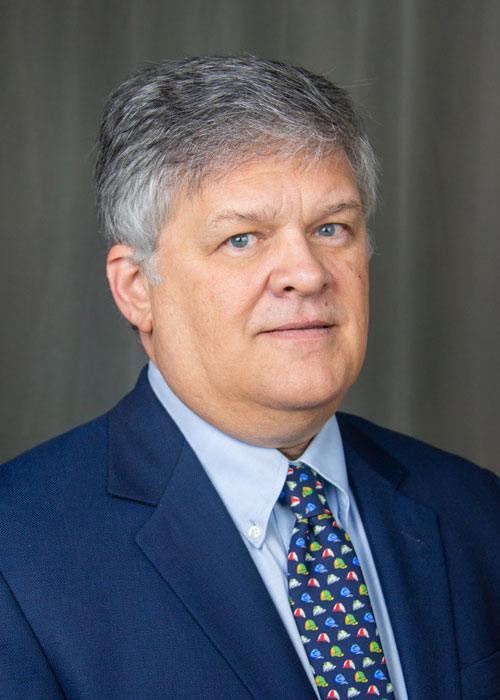Pharmacology
Adele Rawls

Julie Kidd
Hassan Y. Ebrahim

Dr. Ebrahim earned his bachelor's degree in Pharmaceutical Sciences from the College of Pharmacy at Helwan University, Egypt, where he also completed his master's degree in the same field. He then got his Doctor of Philosophy in Pharmacy from the University of Louisiana Monroe, United States. His PhD research work focused on developing bioactive molecules derived from natural sources, including plants, fungi, mushrooms, lichens, and marine organisms, to inhibit breast cancer progression in preclinical models.
Dr. Ebrahim began his academic career as an Assistant Professor at the College of Pharmacy, Helwan University, where he later advanced to the rank of Associate Professor. He also worked as a postdoctoral research fellow in Dr. El Sayed’s lab at the University of Louisiana Monroe, focusing on anti-prostate cancer drug discovery from natural products. Currently, Dr. Ebrahim serves as an Assistant Professor in the Department of Biomedical Sciences at Edward Via College of Osteopathic Medicine (VCOM), University of Louisiana Monroe.
Education
| Year | University | Degree |
|---|---|---|
| 2012-2016 | The University of Louisiana Monroe, College of Pharmacy, Monroe, Louisiana, USA | Doctor of Philosophy in Pharmacy (PhD Pharm) |
| 2005-2008 | Helwan University, College of Pharmacy, Cairo, Egypt | Master of Pharmaceutical Sciences (MPharmSci). |
| 1999-2004 | Helwan University, College of Pharmacy, Cairo, Egypt | Bachelor of Pharmaceutical Sciences (BPharmSci), Excellent with Honors of Merits |
Research Interests
Nature has long been, and will undoubtedly remain, a crucial source of innovation in drug discovery. Natural products and their derivatives constitute a significant portion of FDA-approved drugs, particularly in oncology and infectious disease treatment. My research group leverages extensive expertise in molecular pharmacology and medicinal chemistry to develop anticancer lead compounds and potential drug candidates. We isolate and characterize bioactive metabolites from various natural sources, including lichens, plants, fungi, and marine organisms. Currently, my research focuses on developing natural product-based lead compounds for targeting solid tumors. Among the promising proto-oncogene targets in cancer therapy, receptor tyrosine kinases (RTKs) have emerged as a key focus, with c-Met being a particularly viable candidate for investigation. c-Met, also known as the hepatocyte growth factor (HGF) receptor, plays a pivotal role in the initiation and progression of multiple cancers, including breast and prostate. c-Met/HGF signaling pathway regulates key cellular processes such as proliferation, migration, invasion, survival, and angiogenesis, all of which contribute to cancer development and metastasis. Given its involvement in tumorigenesis and drug resistance, my research group is focusing on discovering natural product-based c-Met modulators for the control of Met-addicted malignancies.
Selected publications
Tarun, M.T.I.; Elsayed, H.E.; Ebrahim, H. Y.; El Sayed, K.A. The Olive Oil Phenolic S-(-)-Oleocanthal Suppresses Colorectal Cancer Progression and Recurrence by Modulating SMYD2-EZH2 and c-MET Activation. Nutrients, 2025, 17, 397.
- Ethar A. Mudhish, Ebrahim, H.Y., Iman E. Helal, Abdullah T. Alhowiriny, and Khalid A. El Sayed. Cannabidiol Suppresses Metastatic Castration-Resistant Prostate Cancer Progression and Recurrence through Modulating Tryptophan Catabolism. ACS Pharmacology & Translational Science 2024, 7(12), 3902-3913.
- Sweilem B. Al Rihani, Khaled H. Elfakhri, Ebrahim, H. Y., Nour F. Al-Ghraiybah, Amer E. Alkhalifa, Khalid A.El Sayed, and Amal Kaddoumi. The Usnic Acid Analogue 4-FPBUA Enhances the Blood–Brain Barrier Function and Induces Autophagy in Alzheimer’s Disease Mouse Models. ACS Chemical Neuroscience 2024 15(17),
3152-3167. - Oliver C. McGehee, Ebrahim, H. Y., Ashkan H. Rad, Khaldoun S. Abdelwahed, Ethar A. Mudhish, Judy A. King, Iman E. Helal, Sharon A. Meyer; Khalid A. El Sayed. Towards Developing Novel Prostate Cancer Recurrence Suppressors: Acute Toxicity of Pseurotin A, an Orally Active PCSK9 Axis-Targeting Small-Molecule in Swiss Albino Mice. Molecules 2023, 28, 1460.
- Abdelwahed, Khaldoun S., Abu Bakar Siddique, Ebrahim, H. Y., Mohammed H. Qusa, Ethar A. Mudhish, Ashkan H. Rad, Mourad Zerfaoui, Zakaria Y. Abd Elmageed, and Khalid A. El Sayed. Pseurotin A Validation as a Metastatic Castration-Resistant Prostate Cancer Recurrence-Suppressing Lead via PCSK9-LDLR Axis Modulation. Marine Drugs 2023, 21, 4, 215.
- Ebrahim, H. Y., Mohamed S Mady, Hanaa B Atya, Sahar A Ali, Heba E Elsayed, Fatma A Moharram. Melaleuca rugulosa (Link) Craven Tannins: Appraisal of anti-inflammatory, radical scavenging activities, and molecular modeling studies. J Ethnopharmacol, 2022, 298, 115596.
- El Sayed, KA; Siddique, AB, Ebrahim, H.Y. Oleocanthal Isolation and Cancer Treatment. US Patent number 10945983, 2021.
- Halawa, A. H.; Elgammal, W. E.; Hassan, S. M.; Hassan, A. H.; Nassar, H. S.; Ebrahim, H. Y.; Mehany, El-Agrody, A. M. Synthesis, anticancer evaluation and molecular docking studies of new heterocycles linked to sulfonamide moiety as novel human topoisomerase types I and II poisons. Bioorganic Chem. 2020, 98, 103725.
Elsayed, H. E; Ebrahim, H. Y., Haggag, E. G.; Kamal, A. M.; El Sayed, K. A. Rationally designed hecogenin thiosemicarbazone analogs as novel MEK inhibitors for the control of breast malignancies. Bioorg. Med. Chem. 2017, 25 (24), 6297-6312. - Ebrahim, H.Y.; Mohyeldin, M. M.; Hailat, M. M.; El Sayed, K. A. (1S,2E,4S,7E,11E)-2,7,11-Cembratriene-4,6-diol semisynthetic analogs as novel c-Met inhibitors for the control of c-Met-dependent breast malignancies. Bioorg. Med. Chem. 2016, doi:10.1016/ j.bmc.2016.09.032
- Ebrahim, H.Y.; El Sayed, K. A. Discovery of novel antiangiogenic marine natural product scaffolds. Mar. Drugs 2016, 14, 57.
- Ebrahim, H.Y.; Elsayed, H. E.; Mohyeldin, M. M.; Akl, M. R.; Bhattacharjee, J.; Egbert, S.; El Sayed, K. A. Norstictic acid inhibits breast cancer cell proliferation, migration, invasion, and in vivo invasive growth through targeting c-Met. Phytother. Res. 2016, 60, 557-566
Awards
- Edward Via College of Osteopathic Medicine, Louisiana Campus, Biomedical Faculty Award of the Musculoskeletal System Block Award, December 2024
- Edward Via College of Osteopathic Medicine Research Recognition Day, Poster Presentation Award, April 2024
- Edward Via College of Osteopathic Medicine, Louisiana Campus, Biomedical Faculty Award of the Integumentary, Hematological, and Lymphatic System Block Award, March 2024
- Edward Via College of Osteopathic Medicine, Louisiana Campus, Biomedical Faculty Award of the Musculoskeletal System Block Award, December 2023
- The University of Louisiana Monroe, Outstanding Graduate Student Award, December 2016
- International Pharma Conference, Podium Presentation Award, September 2017
- The University of Louisiana at Monroe, Podium Presentation Award, Graduate Research Symposium, April 2016
- The University of Louisiana Monroe, Poster Presentation Award, Graduate Research Symposium, April 2015
Activities
- Member, American Association of Pharmaceutical Scientists (AAPS)
- Member, Egyptian Pharmacists Syndicate (EPS)
- Managing Editor, Journal of Advanced Pharmacy Research (JAPR)
- Editor, Cureus Journal of Medical Sciences, Springer Nature, Edward Via College of Osteopathic Medicine Channel
- Guest Editor, MDPI Biomedicines
- Guest Editor, MDPI Nutrients
- Review Editor, Frontiers in Chemistry
- Handling Editor, Frontiers in Public Health
- Editor, Journal of Breast Cancer Survival
David Eagerton

Dr. Eagerton received his Doctorate in Pharmacology in 1992 from the University of South Carolina. During his graduate studies, he also worked as a Poison Control Consultant at the Palmetto Poison Center. In February of 1993, he joined the South Carolina Law Enforcement Division (SLED) as a Forensic Toxicologist, was promoted to Lieutenant in August 1997, and served as Chief Toxicologist, overseeing the SLED Toxicology Department, until his retirement in September 2009. Dr. Eagerton joined the founding faculty of the Presbyterian College School of Pharmacy (PCSP) in October 2009 and was promoted to Associate Professor with tenure in 2015. In June 2017 Dr. Eagerton joined the faculty at Campbell University College of Pharmacy and Health Sciences as Associate Professor and Chair of the Department of Pharmaceutical Sciences. In January 2022, Dr. Eagerton joined the faculty of the Edward Via College of Osteopathic Medicine. Dr. Eagerton is a graduate of the South Carolina Criminal Justice Academy and is Board Certified in Forensic Toxicology. He has authored numerous publications and presentations in the fields of Forensic Toxicology and Pharmacology. He has testified as an expert in the fields of Toxicology and Pharmacology in Magistrate, General Sessions, Federal, and U.S. Military courts and has served as an Expert Witness Faculty Member at the National District Attorneys Association National Advocacy Center since 1999. Dr. Eagerton has served as an Inspector for the American Society of Crime Laboratory Directors / Laboratory Accreditation Board and is a member of the Society of Forensic Toxicologists and the Southern Association of Forensic Scientists. He is the founding President of the Palmetto Association of Toxicologists and is also a certified WMD HAZMAT technician and a former member of the SLED Forensics Weapons of Mass Destruction Response Team and the South Carolina Bioterrorism Advisory Committee. Dr. Eagerton is the Laboratory Director at LifeHope Labs and a member of the American Association of Forensic Scientists Standards Board as a subject matter expert for the Toxicology Consensus Body.
Education
| University | Degree |
|---|---|
| University of South Carolina | PhD Pharmacology |
| University of South Carolina | BS Biology |
Research Interests
Forensic Toxicology
Activities
- Society of Forensic Toxicologists
- Palmetto Association of Toxicologists
- American Association of Clinical Chemists
- American Association of Clinical Toxicologists
Melanie Hyte

Education
Dr. Hyte received her Doctor of Pharmacy from Auburn University School of Pharmacy in 2002 and completed a Pharmacy Practice Residency at Huntsville Hospital in Huntsville, Alabama in 2003 where she received practical experience treating various diagnoses in diverse patient populations. Following her residency training, she served as a clinical pharmacist in an inpatient setting where she gained experience in all areas of inpatient pharmacy. Dr. Hyte then transitioned to a specialized position as the Antimicrobial Stewardship Coordinator at a different facility and developed an antimicrobial stewardship program that later became an Infectious Disease Society of America Antimicrobial Stewardship Center of Excellence in 2020. This specialized position afforded her the opportunity to serve as a preceptor for both pharmacy residents and students. In addition, she provided lectures to family medicine and internal medicine medical residents on a regular basis. In 2021, she became a Board-Certified Infectious Diseases Pharmacist (BCIDP) from the Board of Pharmacy Specialties. In late 2021, Dr. Hyte had a two-fold changeover from clinical pharmacy practice to academia and research when she joined the faculty of VCOM-Auburn. She enjoys teaching pharmacology in the first and second year of the pre-clinical curriculum, mentoring students and pursuing her scholarly interests.
| Year | University | Degree |
|---|---|---|
|
2003 |
Huntsville Hospital - Huntsville, Alabama |
Pharmacy Practice Residency |
|
2002 |
Harrison School of Pharmacy Auburn University - Auburn, Alabama |
Doctor of Pharmacy PharmD |
Research Interests
Dr. Hyte’s research interests include antimicrobial resistance, antimicrobial stewardship, and pharmacogenomics/precision medicine. Currently, she is collaborating with an ambulatory care pharmacist and a local clinic to investigate how patient data can be used to optimize pharmacological management of patients suffering with diabetes mellitus.
Awards
- 2020 IDSA Antimicrobial Stewardship Center of Excellence
- July 2019 Joint Commission Best Practices Library –MAO EMR collaboration
- 2017 BMCS Pharmacy Residency Program Cultivation Award for Best Practice Coach
- 2016 BMCS Pharmacy Residency Program Cultivation Award for Best Practice Coach
Activities
- Alabama Infectious Disease Society (ALIDS)
- Alabama Pharmacy Association (APA)
- Alabama Society of Health Systems Pharmacists (ALHSP)
- American College of Clinical Pharmacists (ACCP)
- Southeastern Research Group Endeavor (SERGE-45)
